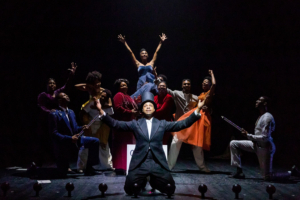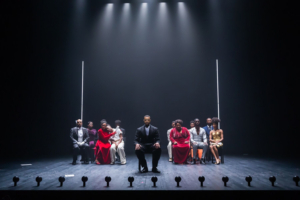Interview: No Clowning Around for Bass-Baritone Davone Tines in Mostly Mozart's THE BLACK CLOWN

Photo: Maggie Hall
The first time I heard bass-baritone Davone Tines--he of the sensual, resonant voice and startlingly vivid stage presence--it was in Handel's ACI, GALATEA E POLIFEMO (described as "a spectacular, streamlined, Cliff-Notes version of a Handel opera"), which headlined countertenor Anthony Roth Costanzo, at Brooklyn's National Sawdust. Tines wowed me and I thought that I wanted to hear more of him.
Since then, I have him heard in other roles--but not in the ways I imagined. There was Matthew Aucoin's CROSSING, Kaija Saariaho's ONLY THE SOUND REMAINS, and excerpts from John Adams' GIRLS OF THE GOLDEN WEST. And, of course, there were some pieces of THE BLACK CLOWN by composer Michael Schachter with a libretto cowritten by Schachter and Tines himself based on a Langston Hughes poem, in a production directed by Zack Winokur, which I witnessed in rehearsal prior its Mostly Mozart premiere on July 24. The company consists of a dozen singer/dancers and a 10-musician ensemble.
But except for a Bellini aria on YouTube, there wasn't a piece by a traditional opera composer in the bunch I heard. With his big, mellifluous voice, it was somewhat disappointing not to hear him rip through a Donizetti, Verdi or Mozart aria, say, but it was nonetheless invigorating to hear him engaged in material written in the 21st century--for the here and now. (NB: He does have some traditional opera works on his mind.)
Taking a guess, I ask him, "Do you do 75% contemporary and 25% traditional work?" "Something like that," he admits. "It may be one third traditional and two thirds contemporary. And that is a constant conversation for me and my management about finding the right balance between them."
In some ways, it must be more interesting to do contemporary work because you can speak directly to the composer and understand their intentions clearly, I suggest to him. Whereas, if you're doing LA TRAVIATA with some guy who works primarily in the theatre and doesn't know much about opera and says, 'Why don't we do it this way?' and it has nothing to do with what's going on, it probably can be quite frustrating.
(That's not to say that every director who comes from some other medium doesn't have valid ideas for opera, we agree, and can infuse European ways of engaging old things into a modern American context. That definitely needs to happen, Tines says, to get honesty in a completely different way that makes sense for today's audiences.)
He nods in agreement about the joys he finds in the work he does. "I've found myself in a privileged position to be able to choose my work at this point, and only choose things I can truly invest in. In terms of doing older works, I will do them when I'm ready. For example, I'd really like to do DON GIOVANNI but I'm not going to do it for maybe five years or more because I will have coached it for three years with Coradina Caporello. I'm not going to rush into it--there's no need to. It's not worth taking that kind of risk-I've shown myself that at least a couple of times.
"Right now, perhaps what I enjoy most about contemporary work is that the impetus for it is always very clear; the team says 'This is why we're doing this. It's new, it connects to this thing' while with older operas it's only interesting to do when the context of why it's being done today is very clear.

Tines debuted THE BLACK CLOWN at A.R.T. in Cambridge (he's a Harvard grad, as well as a Juilliard alumnus); it's a project he's been involved in with his friends and colleagues for about eight years. (He's part of an artist collective/ensemble with Matt Aucoin and Zack Winokur, among others, called AMOC, American Modern Opera Company, to make opera relevant to younger audiences and foster development of artists who create and perform together.)
CLOWN falls in that category of contemporary works that defies categorization. In other words: What is it?
Tines clarifies...somewhat. "We have spent a lot of time talking about what is THE BLACK CLOWN? Is it an oratorio that is staged? Is it a musical? Not really. Is it an opera? Not in the traditional sense. But I've become more and more convinced that it is, indeed, an opera, completely, an opera using all the bells and whistles--all types of music, spirituals, opera, Broadway, vaudeville, etc.-- to outline and highlight and underscore something critical, which is the text, a story that is crucial.
CLOWN started life as a 17-stanza poem about the history of African Americans and their resilience against a legacy of oppression, written by the great Langston Hughes in 1931. He didn't simply compose the words but gave complete directions about how they should be spoken and that it should be presented by a man in "the white suit and hat of a clown," a minstrel-like figure (performed by Tines).
To Tines, it was a natural to bring it to the stage and worked with Schachter--who wrote most of the score, supplemented by spirituals such as "Nobody Know the Trouble I've Seen" and "Sometimes I Feel Like a Motherless Child"--and Winokur to do it. Now it's a 80-minute musical work that has gone through many iterations on its way to its New York premiere at the Gerald W. Lynch Theater at John Jay College, where is will be running for four performances, July 24-27--and, according to Tines, it's likely that it may not be through yet.
When did Tines first become acquainted with this particular poem? I asked. "I've known Langston Hughes since about fifth grade," he recalls. "I won a volume of his poems during a speech contest, where everyone had to get up an recite a poem and I did 'The New Colossus,' the Emma Lazarus poem on the base of the Statue of Liberty. The prize was this little book of Hughes' poems.
"Much later, when I was auditioning for an advanced program at Juilliard, I used a song based on another poem of Hughes, 'Song to the Dark Virgin' by Florence Price. [He starts to sing: 'Would That I were a jewel, A shattered jewel, That all my shining brilliants Might fall at thy feet, Thou dark one...' conjuring up something he hasn't done in a long time, as if he'd done it yesterday.) I found 'The Black Clown' about 2010."
You've been involved with this piece for a long time, I note (eight years he reminds me), and through many iterations (it started out being a song cycle rather than the larger piece it is today). How is it for you to see it change and have to absorb the changes that make it the work concertgoers will see at Mostly Mozart? And, dare I ask, do you feel like you might want to change it more while you're doing it?
"The answer is 'yes' and 'no'," he explains. "'Yes', because everything you work on changes and it's changing now in nice and beautiful ways. And no, because I really feel like we got a few things right and I am doing it with people I love. I feel like the choices we have decided on are there because we either speak a similar language or we have come to solutions organically so we all believe in them.
"We've all bought in to the current vision of the piece. Zack (Winokur, the director) and Chanel (DaSilva, the choreographer) have brought things together in a way that we all got on the same page very quickly, and collaboratively, and that was a good sign. So 'no' I don't want to change it so much; I just want it to grow." Next week, when you're performing it, are you going to be thinking, 'Oh, we should do that differently?' I ask him. "We have been doing that every day, to get where we are.
"The thing I think is so special about this piece, and why I'm so happy about working with Zack and Chanel, is that they've built it as a container for the people who are in it--not a stricture, not a structure but a thing that has some parameters and some suggestions that we can be alive in and bring our ideas to. So we can bring our literal and new and different selves to it each time we do it."
How does he view his personal connection to the material (beyond the obvious racial history)? "Personally, I've always thought of it as the story of a Black man identifying his oppression, contextualizing it and then transcending it," he explains. "Realizing that to understand the situation of a person, any person, you must try to understand 'why' [he is in the situation], by walking through 'how' [did he get there]. Then once that is clear, you can relate differently--but it's only until you identify and contextualize the experience could you possibly move forward."
As for understanding his character in the show, Tines tells me, "For me, it's an odd, constantly shifting thing between being myself and some version of Langston Hughes and also being some everyman. That's also why there are these other characters, because we are all one continual, diverse version of this same character, at least from the perspective of this poem. We're all speaking it together, whether we're singing or dancing, saying words or not."
Mostly Mozart will present THE BLACK CLOWN at the Gerald Lynch Theatre of John Jay College for four performances, July 24-27. For more information, including ticket availability, see the Mostly Mozart website.
Comments

Videos

